INTERVIEW : Monika Czaplicka explique comment sortir vainqueur d'une crise des médias sociaux
Nous avons récemment discuté avec Monika de la manière d'éviter une crise dans les médias sociaux et des aspects positifs que nous pouvons en retirer lorsque nous sommes finalement pris dans une crise. Voici ce que nous avons appris :
Il y a tant de sujets sur lesquels nous devons nous concentrer. Pourquoi avez-vous choisi de traiter crises dans les médias sociaux?
Je pense qu'en réalité, je n'ai pas choisi la ‘ crise des réseaux sociaux ’. C'est elle qui m'a choisi, car il y a près de cinq ans, je travaillais dans une agence spécialisée dans les réseaux sociaux et nous étions en train de rire pendant une réunion au sujet de Nestlé.
Ils ont connu une crise majeure parce qu'une mère avait trouvé un rat dans la nourriture de son enfant.

Nous plaisantions en nous disant que ce serait une bonne idée de leur écrire (à Nestlé) pour leur dire que nous pouvons les aider dans cette crise des médias sociaux. Bien sûr, en tant qu'agence, nous ne l'avons pas fait. Mais je me suis dit que c'était une bonne idée parce que personne ne travaillait sur les crises liées aux médias sociaux et qu'elles étaient très populaires.
Peu de temps auparavant, une autre entreprise avait connu une grave crise sur les réseaux sociaux. Je me suis donc dit : ‘ Bon, il faut faire quelque chose ’.
J'ai donc créé cette page fan qui traite des crises sur les réseaux sociaux, intitulée Les crises des médias sociaux éclatent le week-end car, comme nous le savons tous, le week-end est le moment où nous avons tous du temps libre, et les personnes qui travaillent habituellement (pendant la semaine) se connectent alors aux réseaux sociaux.
Il n'y a donc personne dans l'administration pour gérer les crises, et beaucoup de gens s'y intéressent. J'ai donc créé cette page fan sur les réseaux sociaux et j'ai commencé à écrire sur les crises, puis je me suis dit : ‘ OK, écrivons quelque chose d'intéressant, comme des études de cas ’.
J'ai donc commencé à rédiger des études de cas. Et je me suis dit : ‘ OK, c'est bien. ».
Créons un ebook à ce sujet. ’ J'ai donc commencé à rédiger un ebook sur la manière de gérer une crise sur les réseaux sociaux, etc.
Après 130 pages, je me suis dit : ‘ Hum, c'est un peu trop pour un livre électronique. ’ Alors, je me suis dit : ‘ OK, faisons-en un livre. ’ J'ai écrit à Michał Sadowski, qui est, bien sûr, le directeur de Brand24..
Je lui ai demandé s'il voulait écrire un livre, car il venait d'en publier un quelques mois plus tôt. Il m'a répondu : ‘ D'accord, pas de problème. Je vais te mettre en contact avec mon éditeur ”, et c'est ainsi que tout a commencé.
J'ai publié mon livre sur la gestion des crises sur les réseaux sociaux et c'est là que les choses ont commencé à devenir intéressantes, car les gens ont commencé à me connaître. Aujourd'hui, environ 27 000 à 28 000 personnes visitent la page Facebook consacrée aux crises sur les réseaux sociaux et j'ai un groupe de plusieurs dizaines de personnes qui en parlent, en discutent, etc.
C'est un sujet très vaste qui me passionne, alors je pense que c'était un signe des réseaux sociaux : ‘ Monika, lance-toi ! ’
Je pense que vous avez une communauté assez importante dans vos médias sociaux en ce qui concerne les crises.
Ce qui est amusant, c'est que mon ami m'a écrit pour me dire qu'il avait parcouru d'anciennes présentations dans son entreprise, que je ne connais absolument pas / où je n'ai jamais travaillé, etc.
L'une des présentations portait justement sur moiComment gérer moi quand il y aura une crise des médias sociaux, ou j'écrirai à ce sujet... Je riais tellement. C'est terrible quand les gens pensent que Je suis Je pense que c'est moi qui crée la crise des médias sociaux et qu'ils doivent s'occuper de moi au lieu de s'occuper de la crise.
C'est une histoire assez intéressante. Étant donné que de nombreuses marques n'ont pas de plan pour réagir en cas de crise des médias sociaux, quelle est la principale cause de cette situation ?
Je pense que, comme d'habitude, nous pensons que nous sommes immortels. Nous pensons qu'aucun problème ne peut nous nuire, etc. Ainsi, généralement, nous pensons que nous sommes en sécurité et que nous n'avons pas besoin de nous préparer.
Bien sûr, c'est une bonne façon de penser pour quelqu'un qui se dit ‘ oui, tout va bien ’. Mais ensuite, une crise survient, approche, ou peu importe comment vous voulez l'appeler. Ça arrive, tout simplement, et ils se disent ‘ oh mon Dieu, qu'est-ce qu'on fait maintenant ? ’
Je pense donc que les entreprises devraient y réfléchir à l'avance, car c'est comme la grippe. Si vous ne faites rien, vous allez probablement attraper la grippe. Si vous vous préparez, prenez des vitamines, vous faites vacciner contre la grippe, ou quoi que ce soit d'autre, vous serez probablement immunisé contre cela.
Il en va de même pour les crises sur les réseaux sociaux. Vous pouvez vous préparer afin d'être en sécurité, de sorte que même si quelque chose se produit, vous serez en mesure de réagir car vous saurez comment réagir. Vous n'aurez pas à passer par toutes les émotions car vous serez préparé.
Vous pouvez consulter (d'autres personnes) pour obtenir des informations. Cela ne signifie pas (nécessairement) moi, mais tout le monde, même au sein de votre entreprise. Vous pouvez bien sûr tester les résultats et vos idées.
Et, bien sûr, vous aurez beaucoup, beaucoup, beaucoup plus de temps, car si vous faites un essai préalable, vous pouvez réfléchir à des réponses (possibles), vous pouvez préparer, par exemple, trois réponses ou déclarations différentes, ou autre chose. C'est beaucoup mieux, car vous n'aurez plus qu'à appliquer ce que vous avez déjà essayé dans une situation réelle.
C'est un jeu d'enfant, bien plus facile que de gérer l'intérêt des médias, toutes ces personnes, la tension et tout le reste. Je pense qu'il vaut vraiment mieux se préparer, et si vous pensez que les crises sur les réseaux sociaux ne vous concernent pas, vous êtes tout simplement stupide.
D'accord, j'ai compris. Ma prochaine question serait de savoir comment éviter cela, mais d'une certaine manière, vous avez déjà répondu à cette question. Néanmoins, il y a peut-être quelque chose d'autre que nous pouvons faire pour éviter une crise dans notre entreprise.
Bien sûr, car comme l'a mesuré une entreprise américaine (Altimeter Group), environ 75% des crises liées aux médias sociaux ne peuvent être évitées. Il y a donc un grand nombre de situations qui ne peuvent jamais éviter une crise dans les médias sociaux.
Tout d'abord, nous pouvons nous préparer, ce qui est assez évident. Ensuite, nous devons être proactifs, car généralement, une entreprise se dit : ‘ Bon, évitons toute interaction avec les gens, ainsi tout rentrera dans l'ordre et personne ne remarquera rien. ’
Mais c'est généralement ce qui rend les gens encore plus furieux. Donc, si vous ne répondez pas, si vous ne faites rien, si vous n'interagissez pas avec les gens, ils pensent simplement que vous les évitez ou que vous ne les traitez pas comme de vraies personnes. Nous devons nous rappeler que nos clients, comme tout le monde, sont nos partenaires sur Internet.
Donc, si nous ne répondons pas à leurs préoccupations, leurs problèmes, leurs questions, ils s'énervent et deviennent de plus en plus en colère. C'est généralement ce qui aggrave les crises sur les réseaux sociaux, ce à quoi les entreprises ne pensent généralement pas.
Ils pensent que cela rend les choses plus calmes, ce qui n'est pas vrai.
Bien sûr, vous pouvez aussi penser à réagir rapidement, car parfois, si vous réagissez rapidement à certaines questions, cela permet aussi d'éviter une crise des médias sociaux. Mais ce qu'il faut retenir, c'est qu'il faut vraiment, vraiment réfléchir aux réponses.
Donc, ce n'est pas tant qu'une réponse rapide sera aussi bonne qu'une bonne réponse pour apaiser la situation. Bien sûr, c'est bien si vous répondez en quelques minutes, en 15 minutes, ou quelque chose comme ça.
Mais si vous publiez quelque chose de stupide, il est évident que la situation va dégénérer et que les gens seront encore plus énervés et en colère qu'avant.
Je dis toujours qu'il vaut mieux attendre 5 minutes et réfléchir à ce que vous allez écrire plutôt que de publier quelque chose de stupide, car vous devrez ensuite vous justifier et dire que vous étiez inquiet, etc.
OK, avant de passer à la question suivante, vous avez dit quelque chose d'intéressant : qu'il vaut mieux attendre un peu plutôt que de répondre trop rapidement. Je suis très curieux : quel est le délai dont nous disposons pour répondre à une question lors d'une crise sur les réseaux sociaux ?
Vous avez dit 5 minutes, mais parfois cela peut prendre 15 minutes. Combien de temps avons-nous pour réagir dès les premiers signes d'une crise ??
En général, il n'y a pas de bonne réponse, car lorsque j'ai interrogé les personnes qui ont réalisé cette enquête sur les réseaux sociaux, les réponses aux questions et tout ce qui touche au service, les enquêteurs ont répondu qu'ils pouvaient par exemple attendre plusieurs heures sur Facebook pour obtenir une réponse.
Bien sûr, cela dépend, car si quelqu'un est vraiment en colère et attend une réponse immédiatement, vous n'avez pas trois heures pour répondre. Il s'agit donc plutôt de 5 ou 15 minutes que d'une heure.
En général, je pense que les gens sont prêts à attendre environ une heure ou deux avant de faire quoi que ce soit sur Facebook.
Bien sûr, c'est un peu différent sur Snapchat ou Twitter, car là, il faut vraiment réagir rapidement et on n'a que quelques minutes. Je suis sûr que si quelque chose se passe sur Google+, cela n'a aucune importance.
Sur LinkedIn, par exemple, les gens peuvent attendre encore plus de deux ou trois heures, voire une demi-journée ou quelque chose comme ça. Je pense que, généralement, si nous ne savons pas quoi faire, le moyen le plus simple de ‘ remettre les compteurs à zéro ’ est de répondre que nous avons pris connaissance de votre message, de vos préoccupations, etc. et que nous y travaillons.
Vous n'êtes pas obligé de leur écrire quelque chose de concret si vous ne savez pas quoi faire, mais vous montrez ainsi au client et aux autres personnes qui regardent que vous avez vu cette publication.
En général, si vous n'avez pas de réponse pendant un certain temps, la personne qui a écrit le message et tous ceux qui l'observent (nous devons nous rappeler qu'un grand nombre de personnes nous observent et vérifient ce que nous - l'entreprise - écrivons à notre client), tout le monde vérifie si nous avons vu le commentaire, si nous avons commencé à travailler dessus, et bien sûr, le problème est qu'en général les entreprises ne le disent pas (lorsqu'elles voient le problème ou commencent à y travailler).
Sans aucune interaction, la personne qui a rédigé le commentaire n'a aucune idée de si nous avons vu la publication, si nous l'ignorons ou ce qui se passe.
Le moyen le plus simple de réinitialiser l'horloge est donc d'attendre environ une heure, puis d'écrire ‘ Nous avons vu votre message et nous nous en occupons. Nous vous répondrons dans 5 heures ’.
Les gens diront alors ‘ OK, je vais attendre ’ et ils sauront combien de temps ils doivent attendre. Il vaut également mieux éviter de se mettre en colère et d'éprouver toutes sortes d'émotions négatives autour du sujet ‘ OK, ils ne m'ont pas répondu en deux heures. Ils me détestent. Ils m'évitent. ’ Ou quoi que ce soit d'autre.
OK, compris. Et je pense que vous faites également partie de ma prochaine question, qui portait sur la première mesure à prendre en situation de crise.
Je pense donc qu'il faut ‘ réagir assez rapidement ’, mais quelles sont les prochaines étapes ?
Pas tout à fait. Mon premier conseil est d'aller prendre un café, un thé ou tout autre boisson de votre choix. En effet, comme je l'ai constaté dans de nombreuses crises sur les réseaux sociaux, les gens sont souvent très attachés émotionnellement à la situation, et ce des deux côtés :
le client qui a un problème ou une difficulté, et l'entreprise. En général, toutes les émotions négatives s'expriment sur les réseaux sociaux.
C'est pourquoi toutes les situations – enfin, peut-être pas toutes, mais beaucoup d'entre elles – sont très mal gérées, car elles sont très émotionnelles.
Alors, tout d'abord : calmez-vous. Détendez-vous un peu et prenez du recul par rapport à la situation, car si nous sommes très émotifs, alors généralement, si quelqu'un nous écrit que notre entreprise est nulle, nous sommes émotifs parce que nous avons l'impression que cela nous concerne personnellement et non l'entreprise. Il est vraiment difficile de se détacher de l'entreprise où l'on travaille ou qui nous appartient.
En général, nous réagissons de manière très agressive parce que quelqu'un nous attaque. Si nous prenons du recul, faisons un pas en arrière et considérons la situation dans son ensemble, nous pouvons écrire quelque chose de plus factuel, quelque chose de vraiment bon plutôt que d'émotionnel.
La première étape consiste vraiment à prendre du recul, puis bien sûr, nous pouvons réfléchir aux réponses, si nous ne nous sommes pas préparés à l'avance. Bien sûr, pour préparer la réponse, nous devons disposer d'informations.
Nous devons analyser qui a rédigé le message, son contenu, qui a interagi et si la personne qui a rédigé le message est également celle qui est concernée par le problème, car il arrive parfois que quelqu'un d'autre, un blogueur par exemple, écrive à propos d'une autre personne ou d'un client. Nous devons également vérifier qui est la victime, qui écrit à ce sujet, etc.
Bien sûr, surveillance des médias sociaux Les outils sont très utiles à ce stade, car ils permettent d'analyser si ce sujet est limité à ce seul article ou si un blogueur a publié un article de blog, s'il l'a publié sur plusieurs sites ou uniquement sur notre page.
Nous pouvons vérifier l'étendue des dégâts causés.
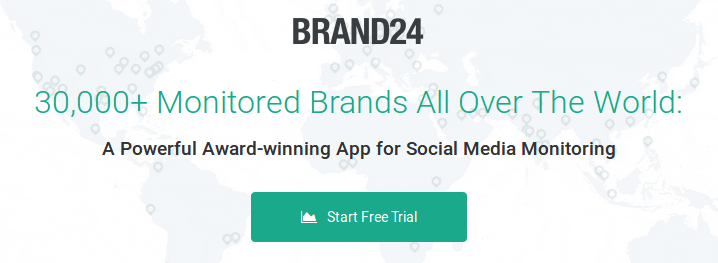
Ensuite, nous pouvons préparer la déclaration. Bien sûr, il y a la règle des "5 C" que vous pouvez appliquer à la déclaration :
Tout d'abord, vous devez avouer. Reconnaissez que vous avez commis une erreur ou admettez que quelque chose n'a pas fonctionné correctement dans le produit/service que vous avez proposé, etc.
Bien sûr, si le problème ne venait pas de vous, par exemple s'il était dû à de mauvaises conditions météorologiques, vous pouvez le mentionner. Mais vous devez y mettre des émotions, des émotions positives, car une crise sur les réseaux sociaux est toujours liée aux émotions négatives de quelqu'un.
Gérer une crise sur les réseaux sociaux consiste à faire disparaître les émotions négatives afin que règnent des émotions positives entre vous, vos clients et toutes les personnes qui vous observent.
Ainsi, si vous avouez et faites preuve d'empathie, vous pouvez (éviter) d'être perçu comme une entreprise bureaucratique monstrueuse, mais vous pouvez être considéré comme une personne qui comprend les émotions négatives.
Par exemple, imaginez que vous avez quelque chose, comme un ordinateur. Vous travaillez dessus, et puis il tombe en panne. Vous êtes vraiment en colère parce que tout le travail que vous avez fait vient d'être perdu sans préavis.
Alors, bien sûr, vous commencez à crier à l'entreprise ‘ vos ordinateurs sont nuls ’, etc. Si elle répond ‘ nous comprenons votre colère, car tout le travail que vous avez accompli est perdu ’, vous vous sentez beaucoup mieux, car vous avez l'impression que de l'autre côté du conflit, quelqu'un comprend vos émotions.
Ensuite, bien sûr, il faut avoir quelques contrition Parce que je sais qu'il est difficile de dire ‘ je suis désolé ’, car nous pensons généralement que si nous disons que nous sommes désolés, cela signifie que nous sommes coupables.
Mais ce n'est pas vraiment ce que cela signifie. Tout est question d'émotions. Tout est question d'empathie.
Donc, même s'il s'agit, par exemple, d'une entreprise avec laquelle nous travaillons, comme notre transporteur (dont le véhicule) est tombé en panne à un arrêt, ou quelque chose comme ça, nous devons présenter nos excuses.
Et faites-le au sein de notre entreprise, plutôt que de dire ‘ non, ce n'était pas notre entreprise, nous sommes super. C'est juste le livreur, le coursier, le facteur ou autre ’.’
Alors, présentez vos excuses et soyez sincère, car la plupart des gens n'attendent que cela. Ils ne veulent rien d'autre - ils veulent juste vous voir ou vous entendre dire que vous êtes désolé et que vous pensez que ce qui s'est passé était mal.
Vous devez alors contrecarrer car, comme je l'ai dit, vous pouvez vous préparer, etc., mais vous pouvez aussi contrer (les accusations selon lesquelles) vous ne répondez pas – vous pouvez interagir avec la personne et essayer de la rendre plus heureuse.
Ce que vous devez écrire dépend de la situation, mais en général, toutes les émotions positives sont les bienvenues. N'écrivez pas que le client est stupide ou qu'il ne sait pas utiliser votre produit ou quoi que ce soit d'autre, car cela rendra également le message plus négatif et agressif.
Vous pouvez alors correctes l'erreur. Ainsi, par exemple, si l'ordinateur est cassé, vous pouvez en envoyer un nouveau. Si le service n'était pas satisfaisant, vous pouvez offrir une promotion ou des articles gratuits, etc.
Cela rend la cliente heureuse et améliore son expérience avec notre entreprise.
Bien entendu, en fin de compte, vous devez compenser car si quelqu'un a eu une expérience négative avec notre entreprise, il est vraiment très important que nous le dédommagions pour améliorer la situation. Et, bien sûr, nous devons garder à l'esprit qu'il ne s'agit pas seulement d'une seule personne.
Il y a probablement des milliers, voire des centaines de personnes qui regardent, qui lisent ce message. Le sujet a probablement été vu uniquement par nos fans ou les amis de la personne qui l'a écrit... Ils ne veulent pas voir que nous sommes parfaits ou que nous ne commettons jamais d'erreurs, car toutes les entreprises en commettent. Les produits échouent et les services ne sont pas aussi bons qu'ils devraient l'être.
Le plus important, c'est que les gens sachent que si quelque chose ne va pas, ils peuvent s'adresser à l'entreprise, qui réagira de manière appropriée. Ainsi, elle compense le problème et rend l'expérience à nouveau agréable.
Je suis un grand fan de Gary Vaynerchuk, qui répète sans cesse ‘ donnez, donnez, donnez, et concentrez-vous sur les gens, pas sur votre entreprise ’. Il en va de même pour les crises sur les réseaux sociaux.
Donc, si vous faites des concessions, offrez une compensation et présentez vos excuses, il y a 99% chances que vous gériez très bien votre crise sur les réseaux sociaux.
Waouh, ça fait beaucoup d'informations. Très, très utile.
Puisque nous parlons des réactions, de la manière dont les marques réagissent, pouvez-vous nous donner quelques exemples de la manière dont les entreprises ont résolu au mieux des crises sur les réseaux sociaux ?.
Oui, bien sûr. La meilleure façon est de voir les exemples par nous-mêmes, je vous enverrai donc également des captures d'écran. J'essaierai de trouver des exemples en anglais.
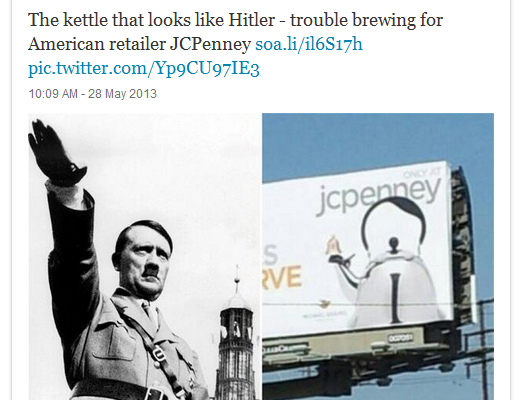
En règle générale, vous pouvez gérer une crise des médias sociaux de différentes manières. Par exemple, s'il s'agit d'une crise relativement mineure, où vous avez juste commis une petite erreur, vous pouvez essayer de vous amuser et d'en rire.
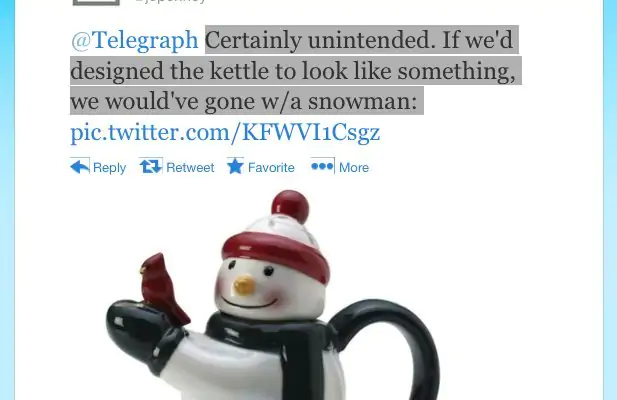
Je pense à une crise sur les réseaux sociaux qui a été gérée d'une manière que j'ai beaucoup appréciée. Heinz, la marque de ketchup, a eu un problème parce que son graphiste avait créé quelque chose d'horrible. Imaginez une savane avec des éléphants.
Il y a une tempête là-bas, et il y a une énorme bouteille de ketchup.
Le texte dit quelque chose comme ‘ qu'il pleuve ou non, le ketchup Heinz est le meilleur ’. En général, cela vous fait penser ‘ mais qu'est-ce qui vient de se passer ? Il était drogué ou quoi ? ’
Bien sûr, ce n'est pas une crise majeure sur les réseaux sociaux, mais en général, les gens disaient ‘ OK, vous devez faire appel à une autre agence spécialisée dans les réseaux sociaux ’... ce genre de choses.
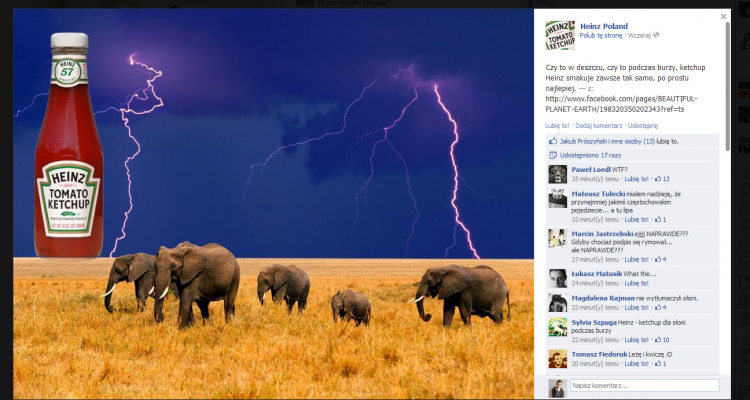
Alors, ils (Heinz) se sont dit ‘ supprimons ça, car c'est horrible pour notre marque ’ et, bien sûr, les internautes sont les internautes... très spécifiques... ils se sont dit ‘ ok, créons une page de fans et demandons à Heinz de “ ramener l'éléphant ! ” Bien sûr, la société s'est dit ’ merde ‘.
Nous l'avons supprimée et ils voulaient la récupérer. ’ Ils l'ont donc republiée, mais ont demandé à l'entreprise de les aider et ont organisé un concours. Bien sûr, beaucoup de gens ont adoré l'idée du ketchup, de l'éléphant, de la tempête et de tout le reste, car c'était tellement surréaliste.
Ils ont donc commencé à créer leurs propres graphiques et images d'éléphants avec Heinz... tout ce que vous pouvez imaginer.
La société (Heinz) a donc répondu : ‘ D'accord, c'est une bonne idée. Organisons un concours. ’ Les gens ont posté leurs photos, avec des idées sur les endroits où le ketchup Heinz pourrait être placé. Bien sûr, il y avait aussi une deuxième partie du concours qui consistait à créer un texte pour accompagner cette photo de l'éléphant dans la tempête :
pour créer la meilleure copie qui soit.
Le concours a remporté un franc succès, car il a fait rire et s'amuser les participants. Ceux-ci ont abordé le sujet de manière très abstraite et ont créé des choses pour Heinz, comme ‘ si vous mangez Heinz, vous aurez de bonnes idées et cela vous inspirera ’.
À partir d'un billet stupide, qui a d'abord été considéré comme un billet horrible, ils ont eu l'idée de se concentrer sur l'inspiration et le surréalisme. En voici un exemple.
Bien sûr, vous devez garder à l'esprit qu'il ne faut jamais se moquer du client. C'est une chose horrible à faire, car lorsqu'on se moque de quelqu'un, cette personne se sent mal.
Il existe de nombreuses émotions négatives, etc. Si vous essayez de faire rire avec quelque chose, assurez-vous que cela concerne uniquement la situation ou votre entreprise, et non vos fans ou vos clients.
Dans toute autre situation, vous pouvez utiliser la règle des "5C" : dire que vous êtes désolé, avouer, etc. Cette règle devrait convenir, car elle a été testée. C'est l'idée générale de la gestion des crises liées aux médias sociaux dans les relations publiques, et ce depuis de nombreuses années. C'est une méthode facile et, disons-le, sûre.
Bien sûr, vous pouvez également essayer de penser à quelque chose d'inhabituel.
Par exemple, je me souviens d'une situation géniale.
Nous (notre agence) travaillions avec une compagnie ferroviaire et quelqu'un a publié une photo des toilettes de notre train, qui étaient complètement blanches. Tout était recouvert de neige et de glace. C'était vraiment horrible.

Bien sûr, la question était ‘ que s'est-il passé ? ’. On nous a répondu que quelqu'un avait laissé la fenêtre ouverte et que le vent était très froid, environ -20 °C ou quelque chose comme ça... et que tout avait gelé.
Nous ne pouvions pas répondre au client en lui disant ‘ désolé, quelqu'un a ouvert la fenêtre et personne ne l'a refermée. Vous êtes stupide. Allez-vous-en. ’
Nous nous sommes donc demandé : ‘ Que faire ? ’ Heureusement pour nous, c'était le début de Game of Thrones. Certains de nos fans ont commencé à créer des maquettes et des montages utilisant Game of Thrones avec le slogan ‘ Préparez-vous : l'hiver arrive ’.
Nous avons donc pris l'une de ces photos et l'avons publiée, en disant ‘ nous sommes désolés, cela n'aurait pas dû se produire ’, etc., et toutes les choses habituelles que l'on dit pour gérer une crise.
Comme nous avons utilisé cette image avec la légende ‘ Préparez-vous : l'hiver arrive ’, nous avons également créé un ‘ sourire ’ autour du nom de l'entreprise, car elle s'appelle Inter-region, mais nous avons écrit Winter-region.
Les gens ont commencé à rire et l'ont beaucoup mieux pris que d'habitude.
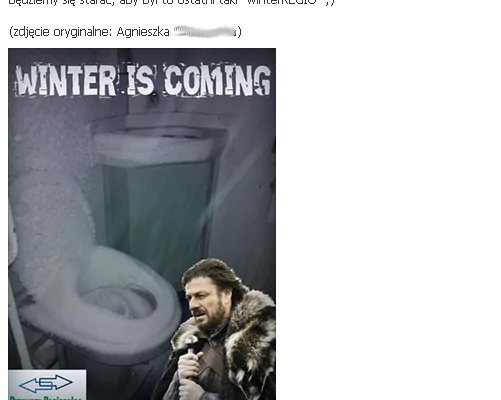
En Pologne, les compagnies ferroviaires sont très détestées, nous étions donc très inquiets. Nous avons utilisé la culture pop et nous nous sommes amusés, et les gens nous ont dit que ce n'était pas grave. Vous savez, nous étions tous dans la même situation, car il faisait très froid à l'époque. Je pense que beaucoup de gens réalisent maintenant qu'ils doivent faire plus attention aux fenêtres dans le train.
En général, il suffit de transformer les émotions négatives en émotions positives et d'essayer de rendre la situation aussi agréable que possible.
Bien sûr, vous pouvez aussi parfois être plus audacieux. Je me souviens que Durex a eu ce problème où l'un de leurs blogueurs faisait un test avec l'un de leurs préservatifs et, bien sûr, le préservatif s'est déchiré.
En Pologne, la réaction a été du genre ‘ Oh mon Dieu. Allons-nous nous retrouver avec un nombre énorme de bébés ? ’

La société a répondu que le test était sympa et qu'elle avait beaucoup aimé l'idée de tester les préservatifs, mais qu'elle en testait généralement environ 300, et non pas un seul, et qu'il ne fallait pas les tester avec des bouteilles de champagne, car celles-ci peuvent être coupantes et risquent de déchirer le préservatif.
Bien sûr, (ils ont mentioned que) vous pouvez contenir environ 30 litres de sperme dans le préservatif, mais la force exercée par l'ouverture de la bouteille est très différente de celle exercée par le sperme. Ils ont tout écrit de manière humoristique, en faisant passer le message que le test était cool mais qu'il devait être amélioré.
Ils n'ont pas dit quelque chose comme ‘ tu es stupide. Tu ne sais pas comment faire le test correctement ’.’
Ils disaient : ‘ D'après nos tests, les préservatifs doivent être aussi résistants que le caoutchouc d'un pneu de voiture. Ils doivent être très solides, mais vous ne devez rien sentir. Bien sûr, ils essaient de les rendre aussi épais, fins et agréables que possible.
En général, ils n'ont pas essayé de créer des émotions négatives autour de la mauvaise qualité du test. Au lieu de cela, ils ont dit gentiment que le test était bon mais qu'il devait être amélioré.
C'est l'idée principale. Créez de bonnes émotions et essayez d'être aussi ouvert d'esprit que possible.
Je pense que c'est une très bonne conclusion pour cet entretien. Je pense que je n'aurais pas pu faire mieux.
Une crise dans les médias sociaux peut être un moyen de gagner l'adhésion des gens, de rendre votre entreprise plus professionnelle et d'accroître votre succès. Si vous le faites bien, avec des émotions positives, vous gagnerez.
C'est un très bon message pour clore cette conversation. Merci beaucoup pour votre temps et pour toutes les informations que vous nous avez données !
Articles connexes
Lectures de haut niveau
Surveillance de marque : outils et guide pour 2026
Stratégie de notoriété de marque [Le guide ultime pour 2026]
Le meilleur AI Hashtag Tracker et autres outils de suivi de hashtag [2026]
Portée des réseaux sociaux : comment la mesurer et l'améliorer en 2026 ?
Outils d'analyse X (Twitter) : Les 10 meilleurs à essayer en 2026
Analyse des sentiments : qu'est-ce que c'est et pourquoi en aurez-vous besoin en 2026 ?
Part de voix : définition, calcul, outils [Guide 2026]
Gestion de la réputation de marque : 6 conseils d'experts pour 2026
Guide complet de l'analyse des médias sociaux par l'IA [2025]
Comment voir combien de fois un hashtag a été utilisé sur X (Twitter)
Démarrage Écoute sociale !
Obtenez la version d'essai Brand24 et commencez l'écoute sociale comme un PRO.

